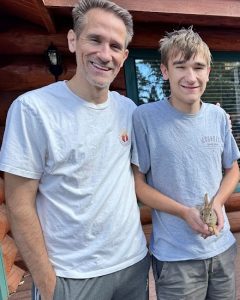In this audio, I’m interviewed by Desiree Ward (Desi), founder of Unconventional Kitchen. Together, we talk about Moms who struggle with guilt, overwhelm, and maintaining balance with work and family. How the way we respond to our challenges has more of an effect on the ultimate outcome than we realize (a review of the ‘Along came a spider’ story), and how to avoid the guilty mom syndrome. (What are we really communicating to our children?)
Resources mentioned on the podcast:
Jackrabbit Factor – free at www.jackrabbitfactor.com
Leslie’s Video – find it at www.prosperthefamily.com
Leslie’s Blog – www.rarefaith.org
More about Desi – www.unconventionalkitchen.com
TRANSCRIPT:
ANNOUNCER: Welcome to the Rare Faith Podcast, where the solution to every problem is only an idea away, where the same activity with just a little more awareness always yields better results. Award-winning bestselling author Leslie Householder brings some of her best information to this inspiring series of life-changing episodes that you won’t want to miss. Show notes for this episode can be found at ARareKindofFaith.com.
DESI: Hi, my name is Desi. I’m creator of The Unconventional Kitchen and your host of The Mom Conference. Up next, we have Leslie Householder, author of The Jackrabbit Factor and Portal To Genius. Leslie Householder is a wife, mother of seven, author, entrepreneur and speaker on the topics of goal achievement, coping with stress, making sense out of setbacks and conquering life’s challenges.
She’s also a three-time bestselling, award-winning, internationally published author of The Jackrabbit Factor, Portal To Genius and Hidden Treasures – Heaven’s Astonishing Help With Your Money Matters, as well as a contributing author to multiple Chicken Soup For The Soul publications and I’m going to add to that, a mother of seven children and so we’re so excited to have you on here, Leslie. How are you?
LESLIE: I’m great, thank you for having me. It’s, it’s great to be here.
DESI WARD: We’re so happy to have you and really quick, we’re going to discuss in this space a little bit about balancing work with family and looking at guilt that sometimes we, as moms feel but before we get into all of that, I really quick want you to tell us your story because it’s such a powerful one.
LESLIE: You know, it’s funny because I was never looking for a career and I never wanted a career. When we married, my husband and I, I wanted to be a stay-at-home mom and that was his plan for our family as well, and we were looking forward to raising a family and all I ever wanted to be was a mom. So when we got married, and we found out that it was a little more expensive just to live and we were not living extravagantly at all. We were starving students, cleaning office buildings at night and going to school during the day, and just trying to make ends meet.
I worked the first year of our marriage and then I had a baby coming, and when the baby was born, we just decided to operate on faith that I was going to stay home with the baby and we would figure out. We would somehow miraculously have enough to live if I just stayed at home and did what I felt like was right for our family.
Well, it only took probably another year before we were deep in debt. My husband lost his job. I was forced back to work doing temp agency work and then my husband started working as a mechanic. I mean, we were just really having a hard time and I remember taking my boy to daycare in the morning when it was still dark because I had to get up that early, and then picking him up in the evening when it was dark again and it just felt, life felt dark and it’s not what we had pictured.
I started questioning for the first time if there really was a God. I mean, I just went through a very, very dark time and this lasted about seven years. We had a few more kids come along during that time but it was tough and I got to a point where I was so depressed. Mindset is everything and depending on our mindset, we respond to different problems in different ways, and to kind of give you an idea of where my mindset was at the time.
There was one day, I came outside of our little apartment to find that some kid had broken my broom in half, and that was just kind of the last straw. You know, you can think of a hundred ways to solve that problem but we didn’t have the money to replace it. It never crossed my mind to try a thrift store. Duct tape never crossed my mind. What did I do? I called the police.
DESI: Oh no!
[Laughter]
LESLIE: That’s where my mindset was and we had some friends who could see that the way we thought was having an effect on our ability to pull out of this. We felt like victims, we were acting like victims. We just weren’t seeing the power we had to make a difference in the outcome and so they invited us to start attending seminars with them, and during those seven to nine years, I counted it up once and we had attended more than 100 seminars.
DESI: Oh wow.
LESLIE: Trying to figure out positive thinking. I mean, I knew there was something to this whole “positive thinking” stuff but I was very analytical and I just couldn’t connect the dots. I would go to these events and they would say “you know, you’ve got to think positive, dream big, picture what you want” and I’d hear all of that and I’d say “yeah, yeah, yeah, okay, got it, but what do I do?”
DESI: Yeah.
LESLIE: You know, “okay, got it, we’ve got it, what do I do? I don’t know what I want. What do I do?” And I just couldn’t hear what they were saying and finally, I was ready to throw in the towel. I said “alright, honey I am done going to these seminars. They make me feel good for about two weeks but then when nothing changes, I get depressed again and this yo-yo emotion you know, that I’m feeling, I just can’t handle it anymore. Plus I can’t justify the money we’re spending.” We were spending grocery money to go to these events. I remember we even traveled to Florida for a big event that was going to change everything, you know.
DESI: Yeah.
LESLIE: With a can of corn in our backpack and not enough money to get a hotel, and we were going sleep in the rental car but then when we got there, we found out we didn’t have enough money on our credit card for a rental car.
DESI: Oh no!
LESLIE: I know, I could tell you stories but finally, there’s this one more coming along, another event and deep down, I felt like I needed to be there but I was just wrestling with what it had always been, you know before. I want something to change permanently and I told my husband “alright, fine, I’ll go to this last one. This is the last one I’m going to and if something really significant doesn’t change after this, I’m done. You can keep going if you want but I’m done” and we attended that one and the presenter was different than all the other presenters we’d ever seen. It had always been very motivational, you know, a lot of hype.
DESI: Yeah, the whole ra-ra.
LESLIE: Ra-ra and this one wasn’t. In fact, it almost, I almost didn’t pay attention because it was so subtle but the presenter showed an illustration that basically boiled down into one very simple package of truth. This illustration that explained how our mind works and why the way we think has an effect on what happens in the world around us, and all of a sudden, we got it.
We just looked at each other and we were like “oh my gosh, that’s all it is?” And we came home and in three months, tripled our income just with this higher awareness and I’ll just mention this in case I forget to mention it later. I ended up training with that presenter to facilitate his programs. I started teaching seminars. This is why I ended up with what you might want to call a career because it had made such a difference in our lives that I couldn’t not share what we had learned because I cared about all those other moms who felt like I had felt.
DES: I was just going to say that. There’s so many moms that, I think can completely relate with you. You know, you never pictured yourself in that role to take care of your family and help out. Sometimes, we have to step in and you know, what an amazing journey that took you there.
LESLIE: Yeah, and that visual aid that changed everything, I’ve got a video where you can go see that for free. You might want to write this down in case we don’t mention it later, and that is ProsperTheFamily.com and they’ll see the full-length seminar video there and they can watch the whole thing for free.
DESI: And that’s the principles that you learned at the seminar?
LESLIE: Mm-hmm, that’s the one that helped us triple our income.
DESI: What was that again? Tell them one more time.
LESLIE: ProsperTheFamily.
DESI: That would be a great resource. ProsperTheFamily.com.
LESLIE: Yeah, and then to kind of just wrap up my story. I found that it was really hard to put on seminars and it took a lot of time away from my family, and that just became too much of a pull so I ended up writing The Jackrabbit Factor to let that be my seminar while I changed diapers at home and that’s also a free download at JackrabbitFactor.com.
DESI: Just a plug for that really quick. I was traveling, downloaded it and read it, and there’s a lot of great truths in there and simple principles. Like you said, they’re so simple but they’re very powerful so it’s a great read, dealing with thoughts. In fact, that leads us to our next question about guilt. So you didn’t plan on having a career and you found yourself working. How did you struggle? I mean, how did you…?
LESLIE: Balance it all?
DESI: Yeah, how did you balance and handle that guilt that sometimes we feel as mothers? And not just surrounding work but I would just say guilt on a lot of levels, you know?
LESLIE: Yeah, yeah, definitely. Well, because we have such high hopes and high expectations for our family, and we have dreams that we want to see fulfilled through our family and so I want to remind you, I want to talk about two things. I want to talk about guilt and I want to talk about balance.
I’ll first start with the balance concept. I honestly have never been good at balancing everything I do. I don’t. I live out of balance most of the time and I really struggled with that. It brought a lot of guilt. Oh, I’m working too much. My kids needs this so I would swing back and I would focus on the kids for awhile but then the work would start to pile up, and I’d need to go back and do more work.
I was constantly responding to what the needs were around me and I felt guilty about that until I was attending another seminar. We were seminar junkies, where the co-author of Rich Dad, Poor Dad Sharon Lechter was speaking and she is a mother and she is a very successful entrepreneur, and she said “okay, everybody stand up.” We all stood up and she says “now, I want you to stand square over your two feet. You know, just solid, straight. Be balanced on both feet, very balanced.” and we did.
She says “how’s the room feel?” We weren’t quite sure what she was getting at. She says “now, I want you to kind of swing back and forth. Shift your weight from one foot to the other, the other to the other” and the room shifted and the room felt lighter. There was buoyancy in the room, this energy of buoyancy and she said “if you are perfectly balanced, you can’t walk. You can’t go anywhere. You can’t shift your weight and allow your other foot to swing forward to make progress.”
She says there is this myth that we have to be balanced. What it is, is it’s temporary seasons of imbalance and being okay with that. Knowing that okay, I’m shifting to this one side because it’s necessary but it’s allowing the other side to swing forward so that when I land again, we’re going to be ahead and we’re going to make progress, and it’s just the way you view what you’re doing that has such an impact.
DESI: I love that example because that just…
LESLIE: How your children view it.
DESI: Yeah and to move forward, you just need that.
LESLIE: Well, you think about Olympians when they’re training for the event, they are completely out of balance.
DESI: Mm-hmm.
LESLIE: But that’s the nature of succeeding in anything and you’re going to find that you will focus on your family for a time to address urgent issues and needs and everything, and other things will fall apart. Like, you’ll get behind in your laundry because your child is sick. You’ll get behind in your dishes because your husband needed something for the weekend. It just is the nature of things and the sooner we can accept that, the sooner we can enjoy the process.
DESI: Definitely, which leads us into the guilt question and I think that you tackled some of that when talking about balance.
LESLIE: Yeah, the guilt thing. You know, I had.
DESI: I don’t think there’s a mom that doesn’t feel it, you know.
LESLIE: I know, I know, I felt a lot of it. As I was teaching the principles that I’d learned and I was seeing other families really benefit from the principles and seeing changes and seeing their incomes increase, and seeing their moms coming home from work and I was seeing so much success in the lives of those that I was teaching that it was very gratifying but at the same time, my kids were like “mom, you’re working again!” “You’re on the computer again!” “Mom, you’re going to speak again!”
And I made the mistake, I didn’t know it was a mistake at the time but at the time, I was telling them “oh honey, it’s just temporary, okay.” “When we achieve this goal (whatever it might have been) then things will be different, then I will have more time with you.” “When this is done, when that goal’s achieved, when we reach this date on the calendar, things will be different.” “I’m so sorry, I know I’m working with so much. I’m so sorry, I’m so sorry, I’m so sorry” and I was constantly apologizing to them for how much time I was spending with the work because I didn’t know how to see it any way differently because I felt like this was not ideal.
DESI: It’s not what you’d pictured.
LESLIE: No, it’s not what I pictured. I pictured being the Kool-Aid mom and driving the kids to soccer, and I pictured having the neighborhood over for, for games in the backyard. I mean, that was kind of the image I had of what motherhood was supposed to be, and my life looked nothing like that and it bothered me until one day it kind of hit me, and I’m not sure what it was that brought me to this but I thought, what am I teaching my children by apologizing all the time for not having more time with them?
Well, a couple of things that was teaching them was that what I was doing was wrong. I mean, in reality what I was doing was necessary and not only necessary but I knew that what I was doing was right because it had become this mission that was bigger than me, that I felt like I was uniquely prepared and groomed to deliver this service to families that needed it so badly.
And so I was teaching my kids that what my husband and I were doing was wrong but it was necessary. It was necessary for our finances and it was necessary to honor that message that I felt like had been given to me to deliver. I was also teaching another problem that I think was doing more damage than I realized was I was teaching my kids that it was acceptable to complain about doing what was necessary.
DESI: Yeah, definitely.
LESLIE: I realized my error when I noticed that they were complaining about their necessary work and expecting things to be easier for them too. Now, for example, they would complain about having to walk to school because I was too busy to drive them half a mile in beautiful weather, you know.
They would complain about having to cook, clean and do the dishes and stuff like that because I was too busy to do my regular motherly duties. So I think that’s what it was. That’s what alerted me to what I was doing wrong when I started hearing them complaining about the things that were necessary in their world.
Number three, I realized I was doing something wrong because it became easy for my kids to conclude that mom and dad just don’t keep their promises because so often the need for me to work stretched for months into years when I didn’t anticipate it needing to do that. I think our children had a harder time believing the things we said because of broken promises constantly, you know.
And lastly, this is number four, that “guilty moms” syndrome caused me to overcompensate in other areas. They begged for more privileges, even privileges that contradicted family policy or just went against plain good sense. I was a lot more likely to give in because I felt guilty about working too much. I have a friend who works for the Los Angeles Police Department. He says he sees a lot of domestic dysfunction from that “guilty parent” syndrome and we just have to be careful that we don’t fall into that trap.
DESI: So how did you switch it around? So once you realized that you were kind of teaching your children that, how did you reteach them, I guess or overcome that?
LESLIE: As soon as I decided to accept my own situation and make the most of it, instead of saying “I’m so sorry for working so much. I wish I didn’t have to do,” I started saying things like this. “Hey, you know what, this is what needs to be done and you know what, it feels really good to work. It feels good to make a contribution.” Or I’d say “hey, let’s both get some work done and at 4.30pm, let’s go to the park. What would you like to accomplish today?”
And so just to change the whole energy around it, I would also, because the work we were doing was helping families all over the world, we would include them in our work. We’d say “hey, we’re going to go do this event. Will you come sit at the tables and interact with those who come to the event, and help sell the books because look at what this is going to do for their families?” And I would share with them some of the testimonials and the feedback that we’d be getting. I’d show them how their contribution was helping families and it became more of a family culture of work, contribution, service and the gratification that comes from all of that.
DESI: What a powerful example for the future. So what do you think it teaches children when they see their parents making contribution to the community?
LESLIE: I think they can get a lot of pride from that. They can be proud of their parents and proud that they belong to this family that makes a difference, and it doesn’t even have to be doing seminars and writing books. It can be serving at a convenience store.
No matter what your work is, if you leave the people who you serve with this impression that their life is better because they interacted with you, that’s a legacy. They’ll take that into their lives and they will learn to serve and the greater the servant, the more superior financial future really is and don’t you want your children to have that? You want them to have a future that’s secure and that comes through being in service and contribution, and filling needs where there are needs.
DESI: I think you’re right too, with all those things and work ethic. Just learning how to work and enjoy. I like what you said “we get to work” – we have that opportunity or that gift to help provide for ourselves.
LESLIE: There’s a lot of people who wish they were working right now.
DESI: Definitely.
LESLIE: If there is something that you’re doing, be grateful that the opportunity is yours.
DESI: I agree and when we were talking earlier, you were talking about after you wrote The Jackrabbit Factor, we were discussing this earlier how you had some big setbacks and how you overcame them, and I thought what you learned was so powerful for the moms. I’d love for you to share kind of that story and how you overcame that, and the thought process, how powerful our thoughts are.
LESLIE: Yeah, definitely. You know, The Jackrabbit Factor tells in a story form, how our thoughts affect the world around us and how to achieve the goals that we want to achieve, and how to partner with God in accomplishing them. And I wrote that because we’d had such great success but it wasn’t long after that, that we made all this money and we had invested all this money in the real estate market at the top, right before it crashed and so when it all crashed, we almost lost everything.
I had to really wake up and say “oh my goodness, I wonder if the book is even relevant anymore. I mean, here I am trying to achieve goals and it’s not working right now, and it’s falling apart and I thought maybe, I need to just pull all the books off the shelves and just give a public apology and just not be the Jackrabbit Factor lady anymore.
You know, it was really bad and there was a little voice in the back of my head that said “keep teaching. You do not make the principles true or false by how well you’re living them.” And that kept me going but my message experienced a transformation during that time. It went from “you can achieve anything” to “how to make sense out of setbacks, how to profit from your losses, how to pick yourself up again when you’ve fallen” and I think it’s really a more relevant message than anything because all of us are going to face setbacks.
All of us are going to have challenges and one thing that I learned. Yes, the way we think is going to have an impact on the opportunities that show up in our life, the opportunities we’re looking for but I learned something very important through this process and it actually became the fodder for the sequel Portal To Genius. And that is that when we set a goal and we do everything right, we’re applying the principles of faith properly and correctly, and we’re doing everything that the formula requires for success, a lot of times what shows up instead of the success is something that looks opposite. It looks like a big setback. It looks like a big roadblock, it looks like a big failure.
DESI: I asked for this and I got this??
LESLIE: Yeah, exactly. Oh, this Jackrabbit Factor thing doesn’t work, you know. Here’s the thing though, I learned that when you set a goal and a challenge shows up, that challenge is part of what you asked for because as we learn to respond to the challenge according to the principles (that you’ll see in the book and in the video that I shared with you) and you respond to it properly, then you become the person who is capable of receiving the thing you asked for in the first place.
But in that moment of challenge, in that moment of disaster, if you think “oh man, this doesn’t work” or “oh, this is not what I asked for” and throw it away, you don’t pass the test and you don’t get what you asked for. And so when I learned that it’s part of the whole process and I’d like to share an example of what this looks like, if you don’t mind.
DESI: Yeah, please do.
LESLIE: My daughter, she was 11 and she came home from orchestra practice and was devastated because as other kids were filling into the room, nobody wanted to sit by her and so she ended up being the only one in the room with an empty chair next to her and she just felt rejected.
And so the next day when I dropped her off, I encouraged her to practice these principles which, in a nutshell, is really picture yourself with an abundance of friends, reminding her to be positive and confident that other people want to be around her and see herself in that place because when you see yourself with the success, it changes your own behaviors.
DESI: Oh, it changes the way you act, for sure.
LESLIE: So she did, she pulled herself together. She had a feeling that things were going to be different that day and she believed she had it there in her heart to think more positively but here’s what happened and it surprised herself. When I picked her up from school, she was excited to report that she had ended up right between two girls that she was really excited to get to know better and I asked her “how’d that happened?” and she said “well, not the way we thought it would happen.”
So contrary to my advice, she showed up earlier than the others and out of habit, she decided to stay in her regular chair at the edge of the room, which was not what we had decided to do, and a few of the other students filled in and the pattern was looking like it was going to repeat itself. But just then, she noticed an ugly spider on her music stand and it kind of creeped her out. She took her folder and tried to push it off but instead of getting it out of her space, it fell onto her leg.
DESI: Oh no!
LESLIE: She shook her pants and she didn’t know exactly where it landed and assuming it was still at her chair, she decided that it would be better to move and it took her out of her comfort zone and into another chair, and one of the girls she wanted to know better came and sat down right next to her. Before long, a second girl took the other empty chair. You know, she says admittedly she thought the answer to her prayer would show up in the form of friends.
DESI: Yeah, people coming to her, or yeah.
LESLIE: Answer the prayer “I want friends, here they are” but instead it showed up as a spider.
[Laughter]
This micro experience really captures the essence of how God deals with us. So often we ask for things to be better but He doesn’t just make things better. He creates conditions in our life that sometimes make us uncomfortable and it causes us to move. You know, so that the blessing we’re asking for is there but we have to move too.
DESI: Oh, definitely.
LESLIE: And so learning to look at the challenges and the disappointments in our life, and instead of saying “oh, this is bad, this is wrong” look at it and say “oh, why is this spider at my stand? It’s moving me. Okay, what am I supposed to learn from this? I am going to hold on to that vision of what I’m trying to accomplish, what I want my life to look like and respond to this without despair.”
It’s hard, it’s still hard. It’s hard for me even now but I’ve seen it enough to know that this is the way life works. It’s the way life works and we ask for something, and we pray for something and we’re, you’re setting a goal for something, to latch on and hold onto that vision and don’t let go of it, and just see the challenges that show up in between, the stuff we didn’t expect, a lot of times is really part of the picture of delivering what we asked for.
DESI: Yeah, because I think a lot of times, we don’t fully understand what we’re asking for and so that character development might be necessary to receive what we’re asking for.
LESLIE: Yeah. Well, and I know that’s for sure because I mean, you never see a speaker or an author out there changing lives with the same mindset that they’re going to call the police on the next person who comes along to break their broom.
You’ve got to grow into who it is you’re trying to become to enjoy, a lot of times to enjoy the very thing you’re looking for and that goes with health, that goes with relationships, it goes with finances, it goes with everything.
DESI: And I think that’s so true because then you really have true gratitude for it, and understand what a real gift it is once you’ve gone through those challenges.
LESLIE: And you have greater compassion and understanding for people who live there now and we become more, more valuable to those around you.
DESI: I think that’s a powerful teaching because we all are in that place. Every single one of us is going to have setbacks come in our life and I think that’s a powerful example that you’ve given us of just looking at the way that we look at it, and our attitude towards it and allowing that to happen to us so that we’re able to grow. And tell us a little bit about achieving tough goals. You’ve achieved a lot in your life, tell us kind of what you’ve used to achieve, what methods.
LESLIE: Well, I’m going to sound like every other seminar speaker you’ve probably ever heard if you’re a junkie like I was, and that is “picture what you want, dream big, you can do it” but it’s so cliche. It’s so cliche and so I’d like to just kind of address what’s really going on under that.
This is really described in the Jackrabbit Factor story and you’ll see that when you go download it for free and read that but it all begins with really having a clear picture in your mind of what it is you’re trying to accomplish. And a real simple example of how this works and how much of a difference that one simple adjustment in the way you think, how effective this can be and this may be personal but you do, do you pray?
DESI: Yes, I do every night and throughout the day. There’s multiple situations with my kids that I need help with.
LESLIE: Yeah and I pray, and I remember back before I understood these principles, I would get on my knees and I would start saying, and I would say “Heavenly Father, you know what, we need you to rescue us. Please send us a new job or please send us money, or whatever because if you don’t, this train wreck at the end of the month is going to be so awful” and all the while I’m picturing the train wreck at the end of the month.
DESI: That’s what you’re focusing your thoughts on.
LESLIE: All the things that are going to go wrong if we don’t get the resources we need, and so on the screen of my mind, I’m picturing the worst-case scenario. My words are asking for the best-case scenario and there’s an incongruity there, and that incongruity between the picture on the screen of your mind and the words you’re speaking or thinking sets up this dissonance on a subconscious level in your heart that prevents a lot of what you’re asking for from coming to you.
We have to be completely in alignment – our heart, our mind and our actions need to match. They need to line up and so this is one very simple adjustment that if you pray, or if you meditate or whatever is your tradition, to picture the thing that you’re wanting as though it’s already happened.
For example, I’m late for an appointment. I need to drop off a package at the post office on the way. I can’t find my packaging tape (and you’ll see this in the video, I describe this actual situation that happened to me) and I’m praying “oh, please help me find this tape. I’ve got to go, I’ve got to go! I’m going to be late, I’m going to be late” and I’m in stress, right?
I’m praying in this feeling of stress where instead, when I reminded myself with what I had learned, I stopped my frantic search. I went and sat down, I closed my eyes and I imagined myself with the tape in my hand and feeling it, trying to involve all the senses that I possibly can, while being grateful that I found the tape. Being grateful, feeling that gratitude now. Thank you for helping me find this tape and then getting up, and going and looking again and I walked right to it.
DESI: Oh wow.
LESLIE: It’s such a simple, simple thing but when you realize this works for the trivial, stupid things day to day, you start wondering if I can do this with packaging tape, what could I do with my life? What could I do with my relationship? What could I do with our finances? You start realizing it’s so simple but that’s why most people miss it. They’ll say “oh, picture what you want, yeah yeah, yeah, got it but what do I have to do?” Well, look a little harder. You know, that’s not it.
We think we understand faith but I’ve realized that having faith is being grateful for something before it’s happened. And if you’re not a religious person, the principles are still true and the way I like to describe it and this, I think works for religious or non-religious it doesn’t matter, but that is that your subconscious mind cannot distinguish the difference between an experience that is real to one that is imagined.
And we, we know this because when we go to a scary movie and your heart’s beating and you’ve got this adrenaline, and it’s because it thinks you’re about to be eaten by a monster and it’s trying to save your life. Your subconscious mind has this job of keeping you alive. It keeps your heart beating all day long, it keeps you breathing through the night. You don’t have to put it on your checklist – beat my heart. It’s keeping you safe throughout your life without you even giving it a second thought.
And so it also helps you achieve your goals if you work in harmony with it. This is what I’m talking about, making sure that all of those different parts and pieces of you are in alignment with each other but if you picture the tape in your hand, and you feel it and you’re involving all your senses, what you’re telling your subconscious mind is that I have tape in my hand, this is my reality.
Like you’re watching a scary movie, this is my reality and it says “oh, you have tape in your hand” but it notices you don’t, and so it helps you, and it’s that reticular activating system that tunes you in, that helps you pay attention to things that you wouldn’t pay attention to otherwise. You go back to the same place you looked before and it calls your attention to that spot you missed subconsciously.
You can call that an answer to your prayer, I do, or you can just call it your subconscious mind helping you out but either way, it’s such a simple thing and it’s so powerful. And once you practice this enough, this is where people start sending me emails saying “oh my goodness, we just retired, we didn’t think we were going to be able to.” “Oh my gosh, I just got into the house that I’ve been dreaming of and I didn’t think it was possible.” Real change happens when you start to practice these principles.
DESI: I think too, if you believe something can happen, you act. You know, if you’re stuck in like how could that ever, doubting and thinking that way, your actions are going be totally different than if you have that belief.
LESLIE: It’s true and honestly, every resource, every opportunity, every idea. Now, the solution to every problem is only an idea away and every idea is just as accessible to you as anybody else. That’s where Portal To Genius comes from, is this genius, you can be a genius at solving your problems but where does that come from? Where do you get those ideas? How do you know what to do? How do you find those opportunities?
As you change your thinking, those opportunities that are already, already around you, suddenly you notice them. Suddenly your subconscious mind kind of says “start a conversation with this person in the elevator” whereas you might not have otherwise. They may be your link to the opportunity you’re looking for.
DESI: Definitely.
LESLIE: Really cool how it works and it’s dependable. Even if a setback shows up instead, it’s part of it.
DESI: It’s part of that answer, it’s just preparing you and moving you towards that.
LESLIE: Exactly.
DESI: Leslie, thank you so much. We’ve learned so much from you in this time and you’re such a powerful example of what our thoughts can do and a good example of a mother of seven and balancing it all, and I loved what you said about balance, of just pushing really hard and then giving somewhere else, and that’s what moves us forward.
So thank you so much for your time. Really quick, I want to inform some of the moms out there of some resources that you have to learn more about this power of positive thought, and tell us a little bit about some downloads and a seminar that you have.
LESLIE: Yeah, like I said before, you can get the whole book The Jackrabbit Factor as a free download at JackrabbitFactor.com. Most people can really read it in one sitting so it’s quick, and then also “The Visual Aid That Changed Everything” the video of the seminar, I wanted to make that available to you for free as well and that is at ProsperTheFamily.com.
DESI: All of these are great resources and some great articles on her blog with more powerful principles. Check out Leslie at TheJackrabbitFactor.com. Also look for the full-length seminar at ProsperTheFamily.com and these are great resources, along with her blog, to help you to conquer that power of positive thought in moving your life forward. Thank you so much Leslie for coming.
LESLIE: Thank you, it’s been fun.
ANNOUNCER: This concludes today’s episode of the Rare Faith Podcast. You’ve been listening to Leslie Householder, author of The Jackrabbit Factor, Portal To Genius and Hidden Treasures – Heaven’s Astonishing Help With Your Money Matters. All three books can be downloaded free at ARareKindofFaith.com. So tell your friends and join Leslie again next time as she goes even deeper into the principles that will help you change your life.


















Recent Comments